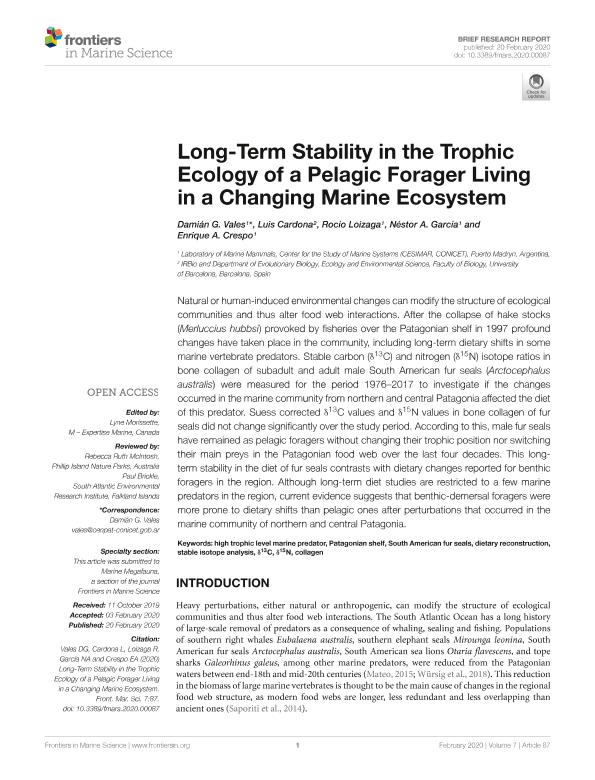Artículo
Long-Term Stability in the Trophic Ecology of a Pelagic Forager Living in a Changing Marine Ecosystem
Vales, Damián Gustavo ; Cardona, Luis; Loizaga de Castro, Rocio
; Cardona, Luis; Loizaga de Castro, Rocio ; García, Néstor A.; Crespo, Enrique Alberto
; García, Néstor A.; Crespo, Enrique Alberto
 ; Cardona, Luis; Loizaga de Castro, Rocio
; Cardona, Luis; Loizaga de Castro, Rocio ; García, Néstor A.; Crespo, Enrique Alberto
; García, Néstor A.; Crespo, Enrique Alberto
Fecha de publicación:
02/2020
Editorial:
Frontiers Media S.A.
Revista:
Frontiers In Marine Science
ISSN:
2296-7745
Idioma:
Inglés
Tipo de recurso:
Artículo publicado
Clasificación temática:
Resumen
Natural or human-induced environmental changes can modify the structure of ecological communities and thus alter food web interactions. After the collapse of hake stocks (Merluccius hubbsi) provoked by fisheries over the Patagonian shelf in 1997 profound changes have taken place in the community, including long-term dietary shifts in some marine vertebrate predators. Stable carbon (δ13C) and nitrogen (δ15N) isotope ratios in bone collagen of subadult and adult male South American fur seals (Arctocephalus australis) were measured for the period 1976–2017 to investigate if the changes occurred in the marine community from northern and central Patagonia affected the diet of this predator. Suess corrected δ13C values and δ15N values in bone collagen of fur seals did not change significantly over the study period. According to this, male fur seals have remained as pelagic foragers without changing their trophic position nor switching their main preys in the Patagonian food web over the last four decades. This long-term stability in the diet of fur seals contrasts with dietary changes reported for benthic foragers in the region. Although long-term diet studies are restricted to a few marine predators in the region, current evidence suggests that benthic-demersal foragers were more prone to dietary shifts than pelagic ones after perturbations that occurred in the marine community of northern and central Patagonia.
Archivos asociados
Licencia
Identificadores
Colecciones
Articulos(CESIMAR)
Articulos de CENTRO PARA EL ESTUDIO DE SISTEMAS MARINOS
Articulos de CENTRO PARA EL ESTUDIO DE SISTEMAS MARINOS
Citación
Vales, Damián Gustavo; Cardona, Luis; Loizaga de Castro, Rocio; García, Néstor A.; Crespo, Enrique Alberto; Long-Term Stability in the Trophic Ecology of a Pelagic Forager Living in a Changing Marine Ecosystem; Frontiers Media S.A.; Frontiers In Marine Science; 7; 87; 2-2020; 1-10
Compartir
Altmétricas



